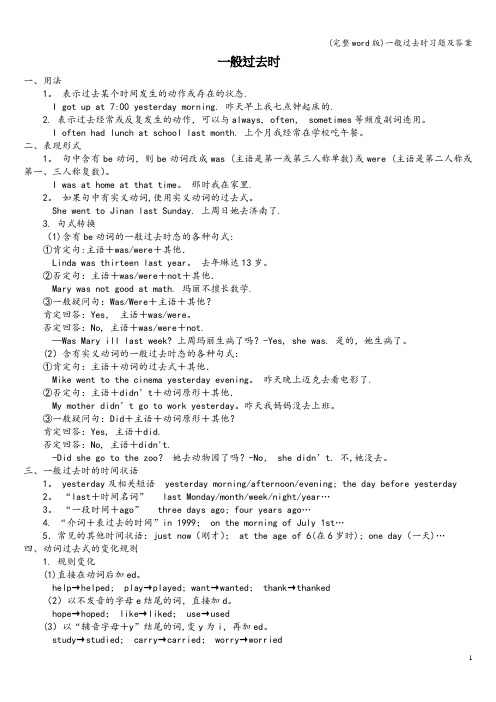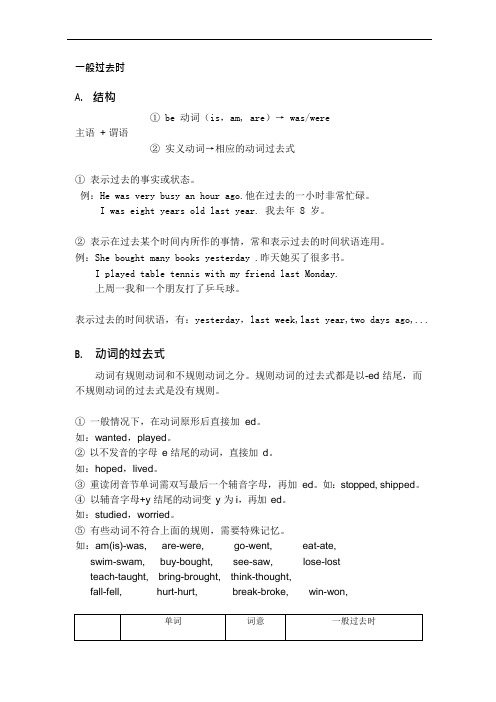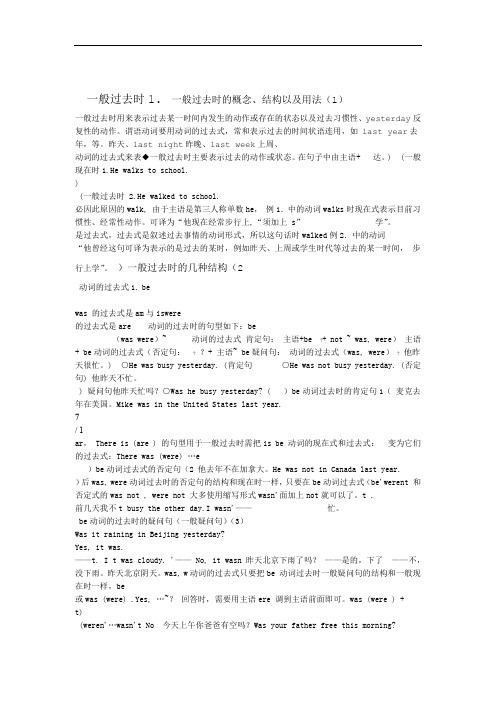(word完整版)小学六年级语法:一般过去时
(完整word版)外研版小学英语语法总复习知识点归纳

(完整word版)外研版小学英语语法总复习知识点归纳外研版小学英语语法总复知识点归纳一、时态1.一般现在时(1)表示经常发生的动作或事情,通常用“usually通常,often常常,every…每…。
sometimes有时,always总是,”等词。
(2)基本结构:主语I / You / We / They /He / She / It肯定句:主语+动词原形或动词第三人称单数形式否定句:主语+don’t + 动词原形或者doesn’t + 动原一般疑问句(Yes/No) Do…。
Yes。
I do.No,I don’t.Does…(动词原形)…?Yes,he/she does。
No,he/she doesn’t.特殊疑问句What do …。
How does she…(动词原形)…?(3)动词第三人称单数方式(同名词单数酿成复数办法不异)1.普通情形+s如:walk-walks2.辅音字母+y结尾去y +ies fly-flies3.结尾是s。
x,sh。
ch +es watch-watches4.结尾是0 +es do-does。
go-goes5.特殊have-has2.现在进行时(1)表示正在发生的动作,通常用“now现在。
look看,XXX听”.(2)根本方式: be +动词-ingeg: I am(not) XXX.You/We/They are(not) reading。
He/She/It is(not) eating.What are you doing。
Is he reading?(3)动词的目前分词方式(动词+ing)普通情形+ing walk—walking末端是不发音的e-e+ingcome—coming重读闭音节双写末了一个字母+ingswim-swimming。
run-running3.一般过去时(1)表示过去已经发生的事情,通常用“last …上一个…。
just now刚才,many years ago许多年前,XXX昨天”等词。
(完整word版)一般过去时及特殊疑问句

一般过去时一、一般过去时的简介:定义:表示过去某时发生的动作或存在的状态.结构:“主语+动词的过去式”用法:1。
表示过去某个时间发生的动作或存在的状态。
He was here yesterday.I got up at seven yesterday morning.My mother was at work yesterday afternoon.Did you have a good time last summer?2。
表示过去经常或反复发生的动作。
My mother often went to work by taxi last year.When I was a student, I often listened to music.3。
常与一般过去时态连用的时间有:at that time, then, at that moment, yesterday, yesterday morning (afternoon, evening…)last night (week, month, year…),一段时间+ago(several days ago), two days ago, a week ago, three years ago…in 1990,(in 1997…) ,just now, long before, long long ago二. 动词过去式构成规则1、一般在动词原形末尾加– edhelp → helped, look → looked, play → played, work → worked, listen → listened, wash →washed, clean → cleaned,2、结尾是 e 的动词加 -- dlive--—lived hope———hoped use-—-used like ——- liked3、末尾只有一个辅音字母的重读闭音节,先双写这个辅音字母,再加-ed。
(完整版)小学英语语法_四大时态

四大时态复习1. 一般现在时(1)一般现在时的构成(肯定句)☆be动词:主语+be(am,is,are)+其它。
如:I am a boy.我是一个男孩。
☆行为动词:主语+行为动词(+其它)。
如:We study English.我们学习英语。
☆当主语为第三人称单数(he, she,it)时,要在动词后加"-s"或"-es"。
如:Mary likes Chinese. 玛丽喜欢汉语。
(2)一般现在时的变化☆. be动词的变化。
[否定句]:主语+ be + not +其它。
如:He is not a worker.他不是工人。
[一般疑问句]:Be +主语+其它。
如:-Are you a student? -Yes. I am. / No, I'm not.[特殊疑问句]:疑问词+一般疑问句。
如:Where is my bike?☆.行为动词的变化。
[否定句]:主语+ don't( doesn't ) +动词原形(+其它)。
如:I don't like bread.当主语为第三人称单数时,要用doesn't构成否定句。
如:He doesn't often play.[一般疑问句]:Do( Does ) +主语+动词原形+其它。
如:- Do you often play football?- Yes, I do. / No, I don't.当主语为第三人称单数时,要用does构成一般疑问句。
如:- Does she go to work by bike? - Yes, she does. / No, she doesn't.[特殊疑问句]:疑问词+一般疑问句。
如:How does your father go to work?*动词+s的变化规则1.一般情况下,直接加-s,如:cook-cooks, milk-milks2.以s. x. sh. ch. o结尾,加-es,如:guess-guesses, wash-washes, watch-watches, go-goes 3.以“辅音字母+y”结尾,变y为i, 再加-es,如:study-studies2.现在进行时(1)一般现在时的构成:be(am,is, are)+ 动词的ing形式。
(完整word版)一般过去时习题及答案

一般过去时一、用法1。
表示过去某个时间发生的动作或存在的状态.I got up at 7:00 yesterday morning. 昨天早上我七点钟起床的.2. 表示过去经常或反复发生的动作,可以与always, often, sometimes等频度副词连用。
I often had lunch at school last month. 上个月我经常在学校吃午餐。
二、表现形式1。
句中含有be动词,则be动词改成was (主语是第一或第三人称单数)或were (主语是第二人称或第一、三人称复数)。
I was at home at that time。
那时我在家里.2。
如果句中有实义动词,使用实义动词的过去式。
She went to Jinan last Sunday. 上周日她去济南了.3. 句式转换(1)含有be动词的一般过去时态的各种句式:①肯定句:主语+was/were+其他.Linda was thirteen last year。
去年琳达13岁。
②否定句:主语+was/were+not+其他.Mary was not good at math. 玛丽不擅长数学.③一般疑问句:Was/Were+主语+其他?肯定回答:Yes,主语+was/were。
否定回答:No, 主语+was/were+not.—Was Mary ill last week? 上周玛丽生病了吗?-Yes, she was. 是的,她生病了。
(2)含有实义动词的一般过去时态的各种句式:①肯定句:主语+动词的过去式+其他.Mike went to the cinema yesterday evening。
昨天晚上迈克去看电影了.②否定句:主语+didn’t+动词原形+其他.My mother didn’t go to work yesterday。
昨天我妈妈没去上班。
③一般疑问句:Did+主语+动词原形+其他?肯定回答:Yes, 主语+did.否定回答:No, 主语+didn't.-Did she go to the zoo?她去动物园了吗?-No, she didn’t. 不,她没去。
(完整版)小学英语一般过去时总结(可编辑修改word版)

一般过去时A.结构① be 动词(is,am, are)→ was/were主语+ 谓语②实义动词→相应的动词过去式①表示过去的事实或状态。
例:He was very busy an hour ago.他在过去的一小时非常忙碌。
I was eight years old last year. 我去年 8 岁。
②表示在过去某个时间内所作的事情,常和表示过去的时间状语连用。
例:She bought many books yesterday .昨天她买了很多书。
I played table tennis with my friend last Monday.上周一我和一个朋友打了乒乓球。
表示过去的时间状语,有:yesterday,last week,last year,two days ago,...B. 动词的过去式动词有规则动词和不规则动词之分。
规则动词的过去式都是以-ed 结尾,而不规则动词的过去式是没有规则。
①一般情况下,在动词原形后直接加ed。
如:wanted,played。
②以不发音的字母e 结尾的动词,直接加d。
如:hoped,lived。
③重读闭音节单词需双写最后一个辅音字母,再加ed。
如:stopped, shipped。
④以辅音字母+y 结尾的动词变y 为i,再加ed。
如:studied,worried。
⑤有些动词不符合上面的规则,需要特殊记忆。
如:am(is)-was, are-were, go-went, eat-ate,swim-swam, buy-bought, see-saw, lose-lostteach-taught, bring-brought, think-thought,fall-fell, hurt-hurt, break-broke, win-won,直接加edwalk 走climb 爬turn 转弯learn 学习cook dinner 做饭play the piano 弹钢琴visit grandparents 看望(外)祖父母clean the bedroom 打扫卧室wash the clothes 洗衣服answer the phone 接电话listen to music 听音乐clean the room 打扫房间collect insects 收集昆虫jump 跳row 划work 工作show 展示look 看help 帮助relax 放松return 归还pass 传递watch insects 观察昆虫pick up leaves 采摘树叶paint 绘画kick 踢ski 滑雪直接加dlike 像,喜欢live 居住dance 跳舞use a computer 使用计算机love 爱taste 尝close 关上prepare 准备不规则变化eat 吃have 有;吃buy 买take 买;带go 去sing 唱歌teach(taught)教run(ran)跑fight(fought)打架get up 起床swim 游泳fly 飞swing(swung)荡sleep(slept)睡觉sweep(swept) the floor 扫地do 做make the bed 铺床draw(drew) pictures 画画write(wrote) a letter 写信catch(caught)butterflies 捉蝴蝶meet(met) 见面drink(drank)喝tell(told)告诉ride(rode)骑find(found)寻找到drive(drove)驾驶come(came)来become(became)变成feel(felt)感觉到think(thought)思考meet(met)遇见fall(fell)落下leave 离开wake(woke) up 醒来bring 带来is am are see 看到grow 种植grew stand(stood)站立词形不变read books 读书put 放set the table 摆饭桌hit (hit)撞击、打cut 切、割最后一个字母双写再加edstop(stopped)停shop 购物把y 变成i 再加edempty the trash 倒垃圾study 学习C. 过去式的肯定、否定、疑问及简短回答①过去式的肯定、否定、疑问及简短回答的形式可表示如下:肯定句I (He, She, We, You, They) went there by bus.否定句I (He, She, We, You, They) didn't go there by bus.疑问句Did I (he, she, we, you ,they) go the by bus?简短回答Yes, I (He, She, We, You, They) did.No, I (He, She, We, You, They) didn't.动词be 的肯定、否定、疑问及简短回答形式如下:肯定句I (He, She) was there.We (You, They) were there.否定句I (He, She) wasn't there.We (You, They) weren't there疑问句Was I (he, she) there?Were we (you, they) there?简短回答No, I (he, she) wasn't.we (you, they) weren't.一、将下列动词变成过去式。
(完整版)小学六年级英语一般过去时

第十七讲一般过去时一. 概念一般过去时表示过去某个时间发生的动作或存在的状态,常和表示过去的时间状语连用。
一般过去时也表示过去经常或反复发生的动作。
例句:1.I watched TV last night.我昨天晚上看电视。
2.What did you do yesterday?你昨天做了什么?3.They went to Beijing last year.他们去年去了北京。
二.用法1.表示过去发生的动作或状态,通常会有明确的表示过去的时间状语。
I went to the zoo yesterday.I stayed up last night.2.叙述过去连续发生的动作或状态。
This morning , I got up early , went out for a walk , then came back and cooked for my family .3.表示过去某一段不确定的时间内发生的动作或状态。
He worked in the store for 5 years.三.Be动词在一般过去时中的变化1. am 和is在一般过去时中变为was。
(was not=wasn't)2. are在一般过去时中变为were。
(were not=weren't)3. 带有was或were的句子,其否定、疑问的变化和is, am, are一样,即否定句在was或were后加not,一般疑问句把was或were调到句首。
四.句中没有be动词的一般过去时的句子1.否定句:didn't +动词原形,如:Jim didn't go home yesterday.2.一般疑问句:在句首加did,句子中的动词过去式变回原形。
如:Did Jim go home yesterday?3.特殊疑问句:疑问词+一般疑问句?如:What did Jim do yesterday?五.动词过去式变化规则1.一般在动词末尾加-ed,如:pull-pulled, cook-cooked2.结尾是e加d,如:taste-tasted3.末尾是辅音字母加一个元音字母和一个辅音字母的重读闭音节,应双写末尾的辅音字母,再加-ed,如:stop-stopped4.以“辅音字母+y”结尾的,变y为i,再加-ed,如:study-studied六.真题再现( ) 1. The boy the tree last week.A. is wateringB. watersC. watered2. I _____(see) his name in the newspaper yesterday.因为句中出现了表示过去的时间状语last week和yesterday,所以正确答案分别为:1. C2.saw精点精练一、用动词的适当形式填空。
完整word版一般过去时讲解

一般过去时1.一般过去时的概念、结构以及用法(1)一般过去时用来表示过去某一时间内发生的动作或存在的状态以及过去习惯性、yesterday反复性的动作。
谓语动词要用动词的过去式,常和表示过去的时间状语连用,如 last year去年,等。
昨天、last night昨晚、last week上周、动词的过去式来表◆一般过去时主要表示过去的动作或状态。
在句子中由主语+ 达。
) (一般现在时1.He walks to school.)(一般过去时 2.He walked to school.必因此原因的walk, 由于主语是第三人称单数he,例1.中的动词walks时现在式表示目前习惯性、经常性动作。
可译为“他现在经常步行上,“须加上 s”学”。
是过去式,过去式是叙述过去事情的动词形式,所以这句话时walked例2.中的动词“他曾经这句可译为表示的是过去的某时,例如昨天、上周或学生时代等过去的某一时间,步行上学”。
)一般过去时的几种结构(2动词的过去式1.bewas 的过去式是am与iswere的过去式是are 动词的过去时的句型如下:be(was were)~ 动词的过去式肯定句:主语+be ?+ not ~ was, were)主语+ be动词的过去式(否定句:??+ 主语~ be疑问句:动词的过去式(was, were)?他昨天很忙。
) ○He was busy yesterday. (肯定句○He was not busy yesterday. (否定句) 他昨天不忙。
) 疑问句他昨天忙吗?○Was he busy yesterday? ( )be动词过去时的肯定句1(麦克去年在美国。
Mike was in the United States last year.7/ 1ar, There is (are ) 的句型用于一般过去时需把is be 动词的现在式和过去式:变为它们的过去式:There was (were) …e)be动词过去式的否定句(2 他去年不在加拿大。
小学语法经典总结---一般过去时1Microsoft Word 文档

1.一般过去时表示过去发生的动作或存在的状态,通常与过去的时间状语连用:yesterday ,last week(month,year)(1)系动词be的过去时: am(is) →was, are →were陈述句:He was at home yesterday.否定句:He wasn’t at home yesterday.疑问句:Was he at home yesterday?Yes ,he was./No ,he wasn’t.(2)行为动词的一般过去时:陈述句:主语+动词过去式+其它I go to the movie. →I went to the movie.否定句:主语+助动词didn’t+动词原形+其它I don’t go to school today. →I didn’t go to school. 一般疑问句:Did +主语+动词原形+其它Do you have breakfast? →Did you have breakfast? Yes,I do./No,I don’t. Yes,I did./No,I didn’t.(3)规则动词的过去式变化规则变化规则例词一般在词尾加—ed. play→played以不发音的e结尾的,只加--d. like →likedlove →loved以辅音字母+y 结尾的,变y为i ,再加—ed. study →studiedcarry →carried以一个辅音字母结尾的重读闭音节,先双写这个辅音字母,再加-ed stop →stopped plan →planned动词不规则变化:do →did have →had go →wentsee →saw read →read get →gotgive →gave sleep →slept eat →atewrite →wrote find_---found2. what’s the date today? It’s …3. What was the date yesterday? It was…4. What’s the weather like today? It’s …?5. How was your weekend?6.What did she do ? She did her homework7.What did he do last weekend ? He played soccer.8.It’s time to go home= It’s time for home。
- 1、下载文档前请自行甄别文档内容的完整性,平台不提供额外的编辑、内容补充、找答案等附加服务。
- 2、"仅部分预览"的文档,不可在线预览部分如存在完整性等问题,可反馈申请退款(可完整预览的文档不适用该条件!)。
- 3、如文档侵犯您的权益,请联系客服反馈,我们会尽快为您处理(人工客服工作时间:9:00-18:30)。
教案教学设计一般过去时1.一般过去时表示过去某个时间发生的动作或存在的状态,常和表示过去的时间状语连用。
一般过去时也表示过去经常或反复发生的动作。
常用的时间状语:yesterday, just now , a moment ago , last week,last year,last Friday,last National Day holiday,the day before yesterday... 2.Be动词在一般过去时中的变化:⑴am 和is在一般过去时中变为was。
(was not=wasn’t)⑵are在一般过去时中变为were。
(were not=weren’t)⑶带有was或were的句子,其否定、疑问的变化和is, am, are一样,即否定句在was或were 后加not,一般疑问句把was或were调到句首。
3.句中没有be动词的一般过去时的句子否定句:didn’t +动词原形,如:Jim didn’t go home yesterday.一般疑问句:在句首加did,句子中的动词过去式变回原形。
如:Did Jim go home yesterday? 特殊疑问句:⑴疑问词+did+主语+动词原形?如:What did Jim do yesterday?⑵疑问词当主语时:疑问词+动词过去式?如:Who went home yesterday?动词过去式变化规则:1.一般在动词末尾加-ed,如:pull-pulled, cook-cooked ,shout-shouted ,point-pointed,2.结尾是e加d,如:taste-tasted , like-liked3.末尾只有一个元音字母和一个辅音字母的重读闭音节,应双写末尾的辅音字母,再加-ed,如:stop-stopped4.以“辅音字母+y”结尾的,变y为i,再加-ed,如:study-studied5.不规则动词过去式:am,is-was, are-were, do-did, see-saw, say-said, give-gave, get-got,go-went, come-came, have-had, eat-ate, take-took, run-ran, sing-sang, put-put, make-made,read-read, write-wrote, draw-drew, drink-drank, fly-flew, ride-rode, speak-spoke, sweep-swept, swim-swam, sit-sat ,become-became, take-took,can-could,swim-swam, bring-brought,drive-drove过去时练习:写出下列动词的过去式is\am_________ fly_______ plant________ are ________ drink_________play_______ go________ make ________ does_________ dance________worry________ ask _____ taste_________ eat__________ draw________put ______ throw________ kick_________ pass_______ do ________Be动词的过去时练习一、用be动词的适当形式填空。
1. I ______ an English teacher now.2. She _______ happy yesterday.3. They _______ glad to see each other last month.4. Helen and Nancy ________ good friends.5. The little dog _____ two years old this year.6. Look, there ________ lots of grapes here.7. There ________ a sign on the chair on Monday.8. Today _____ the second of June. Yesterday ______ the first of June. It _____ Children’s Day. All the students______ very excited.二、句型转换。
1. There was a car in front of the house just now.否定句:________________________________________________一般疑问句:____________________________________________肯、否定回答:__________________________________________2.I went to the park last weekend.(改为一般疑问句) ________________________________________________________(改为否定句)_________________________________________________________三、中译英。
1.我的故事书刚才还在手表旁边。
___________________________________________________________ 2.他们的外套上个礼拜放在卧室里了。
___________________________________________________________ 3.一会以前花园里有两只小鸟。
___________________________________________________________行为动词的过去时练习一、用be动词的适当形式填空。
1. I ______ (watch) a cartoon on Saturday.2. Her father _______ (read) a newspaper last night.3. We _________ to zoo yesterday, we _____ to the park. (go)4. ______ you _______ (visit) your relatives last Spring Festival?5. ______ he _______ (fly) a kite on Sunday? Yes, he ______.6. Gao Shan _______ (pull) up carrots last National Day holiday.7. I ____________ (sweep) the floor yesterday, but my mother ______.8. What ______ she _______ (find) in the garden last morning? She __________ (find) a beautiful butterfly.二、句型转换。
1. They played football in the playground.否定句:________________________________________________一般疑问句:____________________________________________肯、否定回答:__________________________________________过去时综合练习(1)一、用动词的适当形式填空。
1. It ______ (be) Ben’s birthday last Friday.2. We all ______ (have) a good time last night.3. He ________ (jump) high on last Sports Day.4. Helen ________ (milk) a cow on Friday.5. She likes ______ newspapers, but she ______ a book yesterday. (read)6. He _______ football now, but they _______ basketball just now. (play)7. Jim’s mother _________ (plant) trees just now.8. _______ they ________ (sweep) the floor on Sunday? No, they _____.9. I _______ (watch) a cartoon on Monday.10. We ___________ (go) to school on Sunday.过去时综合练习一、用动词的适当形式填空。
1. It _____ (be) the 2nd of November yesterday. Mr White ________ (go) to his office by car.2. Gao Shan ________ (put) the book on his head a moment ago.3. Don’t ______ the house. Mum _______ it yesterday. (clean)4. What ____ you ______ just now? I _______ some housework. (do)5. They _________ (make) a kite a week ago.6. I want to ______ apples. But my dad _______ all of them last month. (pick)7. _______ he ______ the flowers this morning? Yes, he _____. (water)8. She ____ (be) a pretty girl. Look, she _____ (do) Chinese dances.9. The students often _________ (draw) some pictures in the art room.10.What ______ Mike do on the farm? He ________ cows. (milk)二、中译英。
